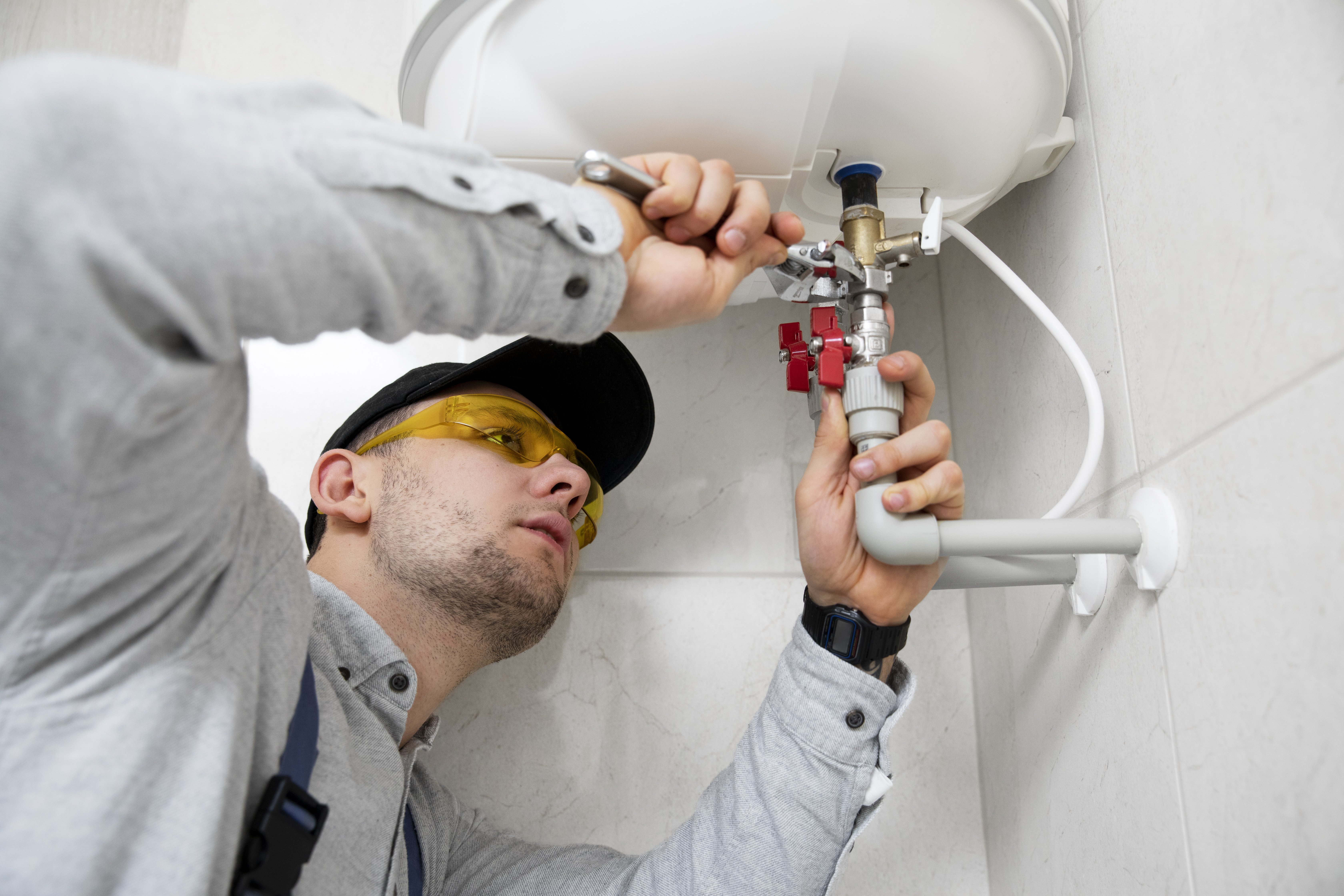How to Start a Plumbing Business
Are you thinking of starting a business in the plumbing industry? You're in the right place!
The global plumbing industry was worth $126.4 billion in 2023. That’s huge! This means there are plenty of opportunities for entrepreneurs like you.
Before diving in, you need to understand the market. Knowing what your customers need and how to meet those demands is key. You might be thinking, ‘How do I stand out?’
Let’s explore the foundational steps, strategies, and insights to help your plumbing startup thrive!
Get your plumbing license
Securing a plumbing license is the first step in getting your business off the ground. This license affirms your technical skills and adherence to relevant building codes while instilling confidence in prospective clients.
Complete the necessary education
Community colleges, trade schools, and vocational programs offer courses for aspiring plumbers. These courses provide the essential knowledge and skills needed for the trade.
Participate in a plumbing apprenticeship
Plumbing demands practical, on-the-job experience to hone your skills. Join an experienced plumber or their company to receive hands-on training in plumbing work. You can even learn the basics of running a plumbing business.
Pass your state's plumbing license exam
Each state has its own set of requirements and testing protocols for the plumbing license exam. Familiarize yourself with the specific criteria for your state.
OR
You can hire plumbers with an existing license and get started immediately!
Once you’ve got the license sorted, here are the next steps for you:
Steps to start a plumbing business
Got your license and finished the training? Great! Starting a plumbing business means you need a solid plan.
1. Define your target market
To get started, it’s crucial to understand who your ideal customers are and what they need.
- Analyze population density: Look at how many people live in your service area. If you are in a high-density area, you might get more opportunities, however, the competition will be more as well. Less populated areas mean fewer competitors but may need broader coverage.
- Understand demographics and needs: Figure out if you'll serve homeowners, businesses, or both. Think about income levels and what plumbing services are in demand, like luxury renovations or regular maintenance.
- Conduct competitor analysis: It’s always a good idea to see what you’re competing against! Check out other plumbing businesses in your area, see what services they offer, and look at their pricing. Find those market gaps so you can stand out from the competition.
2. Set financial goals and growth targets
Setting clear financial goals and growth targets is essential for guiding your plumbing business toward long-term success.
- Set annual revenue targets: Decide how much you want to earn in your first year, then break that into quarterly and monthly goals to keep track and make adjustments. Let’s say you’re aiming to earn $60,000 in your first year. You might break it into $15,000 per quarter and $5,000 per month.
- Research market potential: Check out how much people spend on plumbing services and how often they need them. This will help you figure out your growth opportunities and set realistic revenue goals.
- Define expansion milestones: Plumbing is more than just fixing leaks—think about the future! Plan for growth with milestones like adding new services, hiring staff, or opening new locations. Make sure these goals are realistic based on your market research and how much you can handle.
3. Develop a comprehensive business strategy
A comprehensive business strategy is your roadmap to achieving your plumbing business's financial goals and growth targets.
- Set your marketing plan: Create a marketing plan for your plumbing business. This could include online ads, SEO, direct mail, or partnerships with local businesses.
- Define your operational strategy: Once you’re into the plumbing work, you’ll need to manage everything. It’s better to plan and set up things like inventory, staff management, and scheduling shifts ahead of time.
- Plan your financial management: Set up your budget for startup costs, operations, and marketing. Include strategies for cash flow, pricing, and financial forecasting.
4. Determine pricing strategies
Your pricing strategy is a delicate balance between competitiveness and profitability.
- Research competitor rates: Look at what local competitors charge for similar services. Use this information to set your own rates based on labor, materials, and overhead costs.
- Offer transparent pricing: Build trust with clear pricing on your website. Consider flat rates for standard services and flexible options like emergency service fees or multi-service discounts.
- Communicate value to customers: Show customers the benefits of choosing your services. Emphasize high-quality work and the peace of mind they get from working with you. You can also show customer reviews on your website and business listings.
5. Secure financing or funding
Securing the necessary financing or funding is crucial for your plumbing business's smooth launch and sustained growth.
- Consider small business loans: Loans can give you the funds you need but usually require a solid business plan and financial forecast. It’s important to understand the terms before applying—some might even have fees for paying off the loan early. While loans might seem daunting, good financial planning can help you get started.
- Try to secure a grant: These offer free funding you don’t have to repay, but they can be tough to get. You might want to check if you’re eligible and see what the application process looks like.
6. Acquire necessary tools and equipment
The quality of your plumbing services hinges on the tools and equipment at your disposal. Investing in high-quality, durable tools enhances the efficiency and effectiveness of your services and will lead to you doing a good job.
You doing a good job = customer satisfaction = more referrals = more revenue and profit
- Build your basic toolkit: Start with essentials like wrenches, pipe cutters, pliers, and snake machines. These tools help you handle common plumbing tasks effectively.
- Invest in advanced diagnostic tools: Gradually add tools like inspection cameras and pressure gauges. These advanced tools improve service quality and help prevent job-related injuries.
7. Build an engaging website
A professional website is your digital storefront and the key to making a solid first impression.
- Focus on navigation and responsiveness: Ensure your website is easy to navigate and looks good on all devices. This helps visitors find what they need and enhances their experience.
- Highlight services and use testimonials: Showcase your services with clear content and high-quality images. Feature customer testimonials to build trust and credibility.
Take New Canadian Drain & Plumbing’s website, for example—they show off customer reviews and their awards to instantly build trust with visitors.
- Include CTAs and optimize for SEO: Add clear calls to action on every page to guide visitors toward booking services or contacting you. Optimize your site for search engines to boost visibility.
8. Establish a strong online presence
Building a robust online presence extends beyond your website.
- Create active profiles on key platforms: Be active on Facebook, Instagram, and LinkedIn. Share tips, behind-the-scenes content, and customer success stories to connect with your audience. For example, The Great Plumbing Co. in Toronto has a lively FB page where they share photos of recent work and positive reviews to stay connected with customers.
- Focus on SEO strategies: Use relevant keywords, publish valuable content, and optimize your site’s metadata. These actions help potential customers find your website through search engines.
- Use online advertising: Run Google Ads or social media ads to attract customers searching for plumbing services. This helps drive targeted traffic to your website.
9. Direct client outreach
This is an invaluable strategy for expanding your customer base.
- Use personalized marketing techniques: Reach out to potential customers with email campaigns, direct mail, and local events. Make your messages personal and focused on what they need.
- Follow-up post-service: A quick ‘Thank You’ email or SMS after the service can show your customers you care and remind them to think of you for future needs. It can double as a reminder for their next service check. Plus, it’s a perfect opportunity to ask for a review!
10. Maintain service availability and consistency
What makes a plumbing business trustworthy? Consistent, high-quality work. Here’s how you can make it possible:
- Be there when your clients need you: Keep your schedule organized so you’re available when customers call. Fast responses and quick solutions show you care and help build trust.
- Use a small business CRM to stay organized: A CRM system like Hubspot helps you keep track of clients and manage your schedule. It’s like having a digital assistant to keep everything running smoothly.
How great customer service can grow your plumbing business
Delivering exceptional customer experiences is key to growing and sustaining your plumbing business. Here’s how to do it right:
- Go beyond basic service: Connect with your clients and really get to know their needs. Train your team to be friendly, professional, and helpful to build trust and keep customers coming back.
- Respond quickly: Nobody likes waiting for days to get a leaky tap fixed. Answer calls and emails quickly and solve problems quickly. Your reliability and dedication to fixing issues will make customers happy.
- Ask for feedback and actually listen: Encourage customers to share their feedback through surveys or social media. Respond to reviews and fix things to show you’re all about making things better.
Building trust for your local plumbing business
Laying the foundation for success in any local business involves strategic planning and managing funds. It also requires ongoing efforts to keep your business in the minds of customers.
Building trust is essential for maintaining relevance, and that’s where reputation marketing plays a crucial role:
- Build trust with potential customers: Over 43% of Americans regularly look at online reviews before choosing local businesses. Positive reviews and testimonials establish trust faster than SEO or ads. People are more likely to choose a plumber with a strong, positive reputation in the community.
- Generate word-of-mouth referrals: Satisfied customers spread the word. A good reputation leads to recommendations from friends and neighbors.
Start strong and manage your reputation for plumbing success with NiceJob
Local plumbing businesses compete hard, so having a strong reputation can give you the upper hand.
NiceJob recognizes the pivotal role of positive reviews and a solid online presence in building and maintaining a reputation.
Showcasing your exceptional work and gathering glowing customer testimonials can enhance your business's visibility and appeal.
Grow your plumbing business by building a strong reputation.
Start with NiceJob for free today!
Start Free




